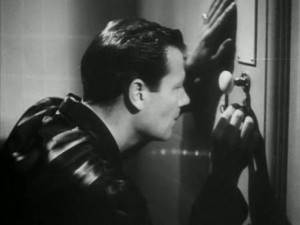Walter Wanger, whose 1938 political film “Blockade” created a major controversy, produced this Hitchcockian thriller about a young American crime reporter (Joel McCrea), who’s assigned to cover Europe.
Though defying much credibility, the tale, ultimately scripted by Charles Bennett and Joan Harrison with dialogue by James Hilton and Robert Benchely, combines spy plots, political assassination, international intrigues, escapes and chases, ending in a famous climax atop the Statue of Liberty.
The movie ends with McCrea in London during the Blitz, with bombs exploding in the background, making a passionate radio plea for American intervention before it’s too late. The film was released on August 27, 1940. Interestingly, Chaplin’s anti-War comedy-satire, “The Great Dictator,” was released two months later, and became controversial due to Chaplin’s speech at the end.
The critic Joe Morella and Edward Epstein describe in their book the conditions of production, noting that producer Wanger paid journalist Vincent Sheehan 10,000 for his book “Personal History.” After hiring two writers to adapt the book, he was dissatisfied with the results and hired John Howard Lawson for a script about the adventures of an American reporter in Spain and Germany.
However, circumstances changed quickly, and before production, set to be directed by Wiliam Dieterle, was to begin, the Spanish Civil war was over, so Wanger hired two March of Time writers to devise a story, only to later switch back to Sheehan’s book. However, when the project was assigned to Hitchcock, he started all over again.
Due to the rapidly shifting political context, Hitchcock had to rewrite and reshoot several scenes, though ultimately what makes the film so engrossing are its spectacular set-pieces. Ultimately, more writers have worked on different versions of this saga than on any other Hitchcock or Wanger picture.
Reportedly, “Foreign Correspondent” was a favorite of the Nazi Minister of Propaganda, Joseph Goebbles, who went on record saying: “A first class production, a criminological bang-up hit, which no doubt will make a certain impression upon the broad masses of the people in enemy countries.”
Goebbels also noted his surprise that despite the film’s anti-Germany tendency, “it was allowed to run for months in Switzerland and Sweden: “The Swedes and the Swiss are playing with fire. Let us hope they will burn their fingers before the War is over.”
Cast
Johnny Jones/Huntley Haverstock (Joel McCrea)
Carol Fisher (Laraine Day)
Stephen Fisher (Haerbert Marshall)
Scott Ffolliott (George Sanders)
Van Meer (Albert Basserman)
Stebbins (Robert Benchley)
Rowley (Edmund Gwenn)
Krug (Eduardo Ciannelli)
Tramp (Martin Kosleck)
Mr. Powers (Harry Davenport)
Oscar Nominations: 6
Picture, produced by Walter Wanger
Screenplay (Original): Charles Bennett and Joan Harrison
Supporting Actor: Albert Basserman
Cinematography (b/w): Rudolph Mate
Interior Decoration (b/w): Alexander Golitzen
Special Effects: Paul Eagler and Thomas Moulton Special Effects: Jack Cosgrove, photographic; Arthur Johns, sound
Oscar Awards: None
Oscar Context:
In 1940, Hitchcock’s Oscar winner “Rebecca” competed for the top award with nine other films: Hitchcock’s own “Foreign Correspondent” (on of his lesser movies), “All This and Heaven Too,” “The Grapes of Wrath,” “The Great Dictator,” “Kitty Foyle,” “The Letter,” “The Long Voyage Home,” “Our Town,” and “The Philadelphia Story.”
Like Hitchcock, John Ford had two movies in contention: “The Grapes of Wrath,” starring Henry Fonda, and “The Long Voyage Home,” with John Wayne.
In the Academy’s history, only two suspense-thrillers, Hitchcock’s “Rebecca” (1940) and Jonathan Demme’s “The Silence of the Lambs” (1991) have won the Best Picture Oscar.
Hitchcock’s first America movie, Rebecca, was nominated for the largest number of awards in 1940, 10, winning two, including Best Picture.
The other most nominated pictures were John Ford’s socially aware class drama “The Grapes of Wrath,” and William Wyler’s melodrama, The Letter,” each with 7.
With the exception of Jonathan Demme, no other filmmaker has ever won the Director Oscar for a thriller. Hitchcock was nominated five times, for “Rebecca,” “Lifeboat” (1944), “Spellbound” (1945), “Rear Window” (1954), and “Psycho” (1960). And four of Hitchcock films were nominated for Best Picture, the aforementioned “Rebecca” and “Foreign Correspondent,” “Suspicion” (1941) and “Spellbound.” However, Hitchcock never won a legit Oscar, though the Academy later compensated him with an Honorary Award.
In 1940, “Rebecca” won the Cinematography Oscar (by George Barnes), “Pride and Prejudice” the Art Direction, and “The Thief of Bagdad” Special Effects. Preston Sturges won the Original Screenplay Oscar for “The Great McGinty,” and Walter Brennan won his third Supporting Oscar in five years (a record) for Wyler’s “The Westerner.”






